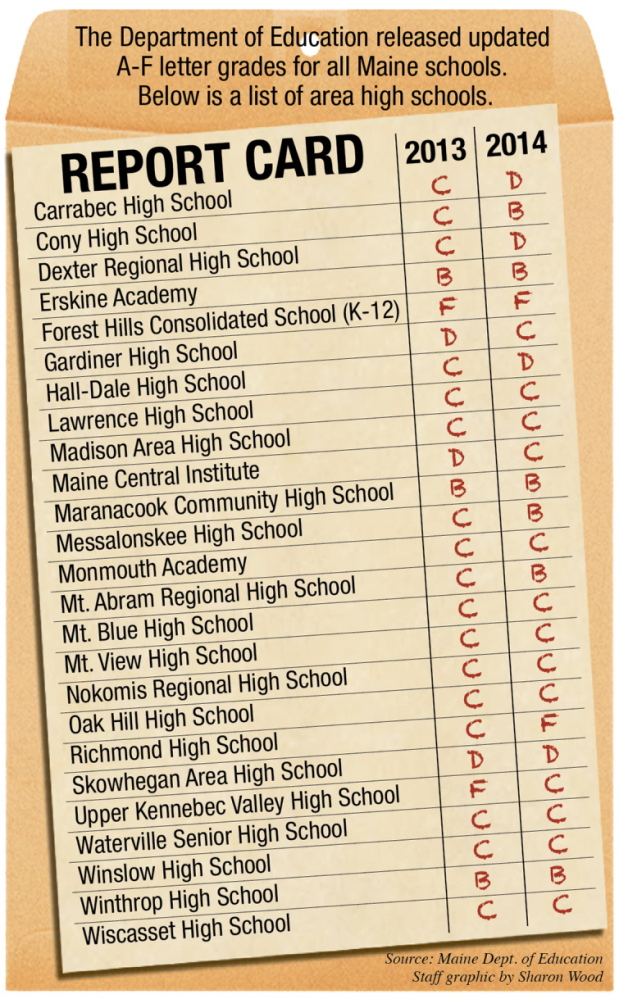AUGUSTA — Maine elementary and middle schools lost ground on the report cards released by the state Thursday, with the number of schools receiving a C or better dropping by 8 percentage points.
When the Department of Education issued the first A-F report cards last year, 80.9 percent of elementary and middle schools “passed.” That number fell to 72.8 percent this year.
The passing rate for elementary and middle schools is still slightly better than for high schools, which held steady. One more high school than last year received a C or higher, putting the rate at 70.5 percent.
Overall, 93 schools received a higher grade this year than last, and 153 received a lower grade. Locally, one superintendent said poor grades for schools in China and Oakland can be attributed to a new curriculum and grading system.
The most common grade is a C, received by 47.5 percent of high schools and 50.4 percent of elementary and middle schools. The Department of Education set the cutoff points between letter grades last year to create a bell curve — highest in the middle and tapering off to either end — and those points and the grading formulas remained unchanged this year to allow for valid comparisons.
The report cards released Thursday are based on testing and graduation data from 2012-13.
Regional School Unit 18 Superintendent Gary Smith said his Oakland-based district’s elementary schools made big changes that year in the transition to proficiency-based education, including a new curriculum and a new grading system.
Smith speculated that growing pains could have been a factor in the test scores that resulted in lower grades for four RSU 18 schools, including F’s for China Primary School and Williams Elementary School in Oakland. Last year, China Primary got a B and Williams Elementary a C.
“It’s not an excuse, but any time when you make a major shift, you don’t necessarily perform at the level you expect to,” Smith said. “We’re trying to better understand what happened.”
Smith doesn’t believe that the report card system is the best way to accomplish the stated goals of Gov. Paul LePage and the Department of Education to ensure that schools are accountable and transparent, but he does believe in those goals. Smith said it will greatly benefit schools if parents and the public are informed about and involved in what’s happening in the schools.
PERFORMANCE SNAPSHOTS
In a media release, Education Commissioner Jim Rier said the report cards provide a learning opportunity.
“Some will be quick to dismiss the grades and the department that delivers them, and I understand that,” he said. “Others will use them exactly as we intended, seeing them as a snapshot of a school’s performance and a springboard for diving into the data to learn more about a school’s strengths and where there are opportunities for improvement.”
High school grades are based on SAT proficiency rates in math and reading, progress on SAT scores and graduation rates. For elementary and middle schools, the formula includes math and reading proficiency rates from the New England Common Assessment Program tests, individual growth shown by all students and growth by students who scored in the bottom 25 percent the previous year.
Few central Maine schools received A’s: only Fayette Central School, RSU 2’s Dresden Elementary and RSU 54’s Canaan Elementary got the top grade.
More schools this year — 20 high schools, a preK-8 school and a junior high school — were docked one or more letter grades for failing to meet participation thresholds on standardized tests. In Central Maine, that includes Carrabec High School in North Anson, Hall-Dale High School in Farmingdale and Skowhegan High School, all of which would have received C’s instead of D’s if 95 percent of juniors had taken the SAT last year.
CONY, WHITEFIELD IMPROVE
Augusta’s Cony High School scored better in all parts of the grading formula, and its grade rose from a C to a B as a result.
When Rier visited Cony on Wednesday to highlight its achievement, teachers told him about the things they’re doing to boost student achievement, such as working more collaboratively across departments. Principal Kim Silsby said the work they’re doing helps students succeed, but might not always earn Cony a good report card grade.
“We’re going to work this hard and this well regardless of what score is, and sometimes it all comes together, like this time we were at the B level,” Silsby said. “Next year we might be a C, but it’s still the same level of commitment of our staff.”
RSU 12 Superintendent Howard Tuttle said he is glad to see higher grades for Windsor’s and Whitefield’s elementary schools, but he was surprised that Chelsea Elementary School remained at a C. Chelsea Elementary received recognition from the Department of Education in March for being a High Progress Reward School, a category created in Maine’s new federal accountability system.
“We expected to see the letter grade go up at Chelsea because of that, and somehow it didn’t,” Tuttle said. “I need to dig in and understand what the difference is and why that would be. It’s confusing to get two conflicting pieces of information like that.”
When Whitefield Elementary School got an F last year, Principal Joshua McNaughton said he already expected the school to do better the next year, based on internal data. That came to pass on Thursday, when Whitefield received a D.
“I think the D shows the value in the work that we’re doing,” he said. “We’re progressing.”
McNaughton said the assistance that the Department of Education pledged to provide to schools with low grades never materialized.
With early releases on Wednesdays this year to provide more professional development time for staff, the school continued its intensive focus on literacy. Whitefield is part of the Maine Literacy Partnership, and a literacy coach helped teachers with their instructional practices.
STUDENTS HELPING STUDENTS
Unity-based RSU 3 Superintendent Heather Perry said her district’s schools that got D’s and F’s last year also received little outreach from the state, but that’s not necessarily a bad thing. She said it seems the Department of Education is trying not to be overly prescriptive about improvement processes and seems to understand that RSU 3 is working hard on its own plan to implement proficiency-based education.
“We really would just like to change our system and not deal with a lot of other distractions,” Perry said. “As long as we are continuing down that path, they’re just kind of letting us go, which is nice.”
After receiving two F’s, two D’s a C last year, RSU 3’s elementary schools had three D’s, a C and a B this year. Mount View Middle School remained at an F.
Rier visited Walker Memorial School in Liberty on Tuesday to highlight its improvement from a D to a B. Perry said Walker has good teachers who really understand the proficiency-based model and do effective grouping and regrouping of students across ages based on their learning needs.
Perry said all of RSU 3’s elementary schools are working on those things, and she expects to see the effects in future grades for all of them.
“Three of our schools jumped ahead a little bit, and I think we’re seeing those schools have an impact earlier for student learning, but eventually we’re going to see that happen for all of our schools,” Perry said.
Maine is one of 15 states giving letter grades to schools, according to the Foundation for Excellence in Education, an organization that promotes A-F school report cards and other reforms instituted by former Florida Gov. Jeb Bush.
LePage and then-Education Commissioner Stephen Bowen debuted the report cards for Maine schools last May, saying they make it easy for members of the public to understand how their local schools are performing and therefore promote greater accountability.
TOO SIMPLE?
Critics, including educators and Democratic legislators, criticized the grading system. They said it’s simplistic to try to reduce a school’s success to a single letter and noted a strong correlation between low grades and a school’s poverty rate.
Those groups repeated their criticisms on Thursday.
“One way to truly put students first is to celebrate their successes instead of focusing on challenges and pointing the finger at some as failures,” Maine Education Association President Lois Kilby-Chesley said in a statement. “Governor LePage’s arbitrary grading system is one more way he chooses to demoralize and demean Maine’s students and teachers.”
LePage’s opponents in this year’s race for governor, Independent Eliot Cutler and Democrat Mike Michaud, both released statements opposing the grading system, saying it’s not an effective way to foster improvement in Maine’s schools.
The system could be vulnerable to the outcome of the election in November. Neither Maine law nor the federal accountability system requires the Department of Education to issue letter grades to schools.
The Legislature commissioned a study last year by the Maine Education Policy Research Institute to determine the factors that affect student success. They found that poverty and teacher experience have the greatest impact.
In response, the Department of Education added information to the report cards detailing each school’s rate of free and reduced lunch eligibility, average years of teacher experience and districtwide instructional spending per pupil. Those data points were not factored into the grading formulas.
The letter grades are assigned to all public schools, including charter schools and the state’s 11 town academies. They will not be used to rate private schools or career and technical schools. Some charter schools are not included yet, because two years of data is required for elementary schools to be assessed, and three years of data for high schools.
There will be no report cards next year because of the switch to the Smarter Balanced Assessment Consortium tests starting next spring.
Rier said that gap will give the department plenty of time to make sure the system is measuring the right things before issuing the next report cards. The Department of Eduction plans to convene a stakeholders group next year, including educators and parents, to take part in that review.
Susan McMillan — 621-5645 | smcmillan@centralmaine.com | Twitter: @s_e_mcmillan
Send questions/comments to the editors.




Success. Please wait for the page to reload. If the page does not reload within 5 seconds, please refresh the page.
Enter your email and password to access comments.
Hi, to comment on stories you must . This profile is in addition to your subscription and website login.
Already have a commenting profile? .
Invalid username/password.
Please check your email to confirm and complete your registration.
Only subscribers are eligible to post comments. Please subscribe or login first for digital access. Here’s why.
Use the form below to reset your password. When you've submitted your account email, we will send an email with a reset code.